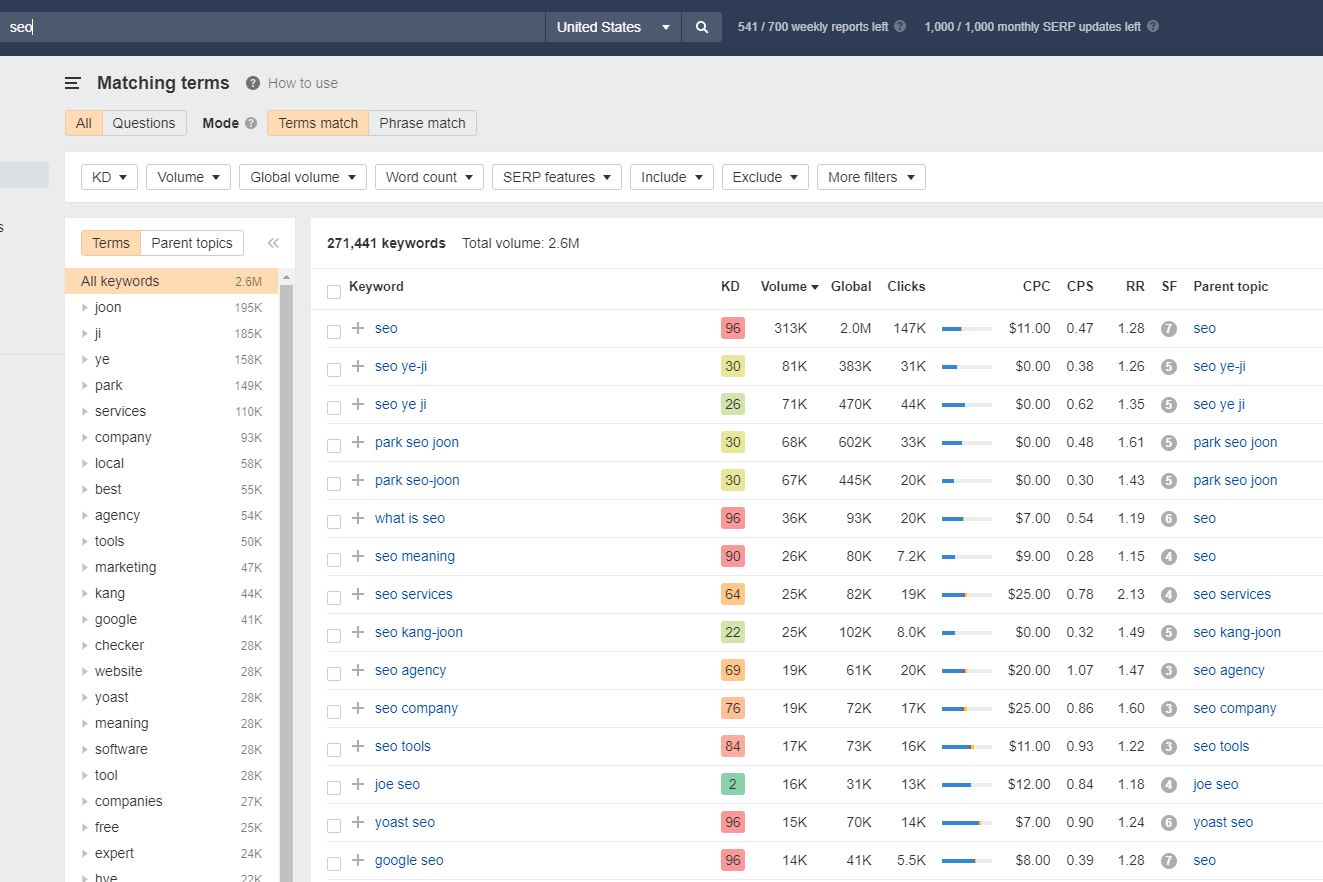SEO For Dummies: 5 Things You Need To Know

Are you trying to improve your presence online, but aren’t sure how you can benefit from SEO? In this SEO For Dummies guide, we provide you with five things everyone must know when building a site and an audience.
1. What Is SEO?
SEO stands for search engine optimization, which is a technique used to match your information (webpages, services, etc) with what the world is searching for online. There is a science to the first result of any Google search. Whichever webpage holds that coveted number one spot has properly satisfied all of Google’s SEO requirements for relevant and up-to-date information.
SEO is all about answering the questions of the general public without using paid advertisements. With proper SEO, you can optimize one piece of content to generate leads and sales for years to come. The power is in your hands with SEO, unlike advertising services. PPC (pay-per-click advertising) only delivers results for you as long as you keep paying the steep prices to run these ads on Google. SEO has never been a secret; it has a long and proven track record of successful results.
2. SEO Terms
Here are a few key SEO terms and phrases that everyone needs to know:
SERP
SERP stands for Search Engine Results Page. This is the page you will encounter after looking for terms on a search engine. A SERP will display both paid advertisements and organic results.
Domain Authority
Think of domain authority as simply an extension of link equity. A website’s domain authority is measured by the link equity off all pages contained within the site. A domain authority (DA) directly relates to its ability to rank in a search engine.
Domain Ranking
Domain ranking (DR) is similar to domain authority, but it is a measured a bit differently. DR is used to rank websites, overall. The ranking will be based on a website’s portfolio of backlinks on a scale of 0-100. Both the domain ranking and authority are used to determine the overall quality of a site.
Short-Tail And Long-Tail Keywords
Short-tail keywords tend to be more generic and popular terms that have a high search volume. Using these terms can help garner more traffic for your site. An example of a short-tail keyword would be something such as “retirement age.” Long-tail keywords contain three or more words to identify a user’s intent. An example of this could be “full retirement age for social security.” These keywords will generally have a lower search volume than short-tail keywords.
Meta Description
Meta descriptions are the text you’ll find below the title tag on SERPs. These descriptions must clearly explain what your content is about. Make sure to include your main keyword(s) within the meta description. These will help users determine whether or not they are interested in your content.
3. Keyword Research
It is possible to do everything correctly and still rank for keywords that produce insufficient traffic. Thankfully, that’s where SEO tools like Ahrefs come into play. This tool, specifically, will help you find high-quality keywords to pull in traffic in a matter of minutes. Ahrefs will show you which keywords generate the most traffic and how difficult these terms may be to rank for. You can also get a glimpse of what your competitors currently rank for and how to overtake them.
So, how do you know which keywords are worth ranking for? Take a look at the cost-per-click (CPC) to help you decide. Next, check the search volume and level of difficulty. If your company is just starting out with a brand new online presence, try to use keywords with a ranking difficulty no higher than 30 (pictured below) . Once you’re ranking and can see how many searches the term gets, you’ll be able to estimate just how much money you can make off this content each month. Of course, make sure you attempt to rank for terms that are relevant to your business and/or services!
4. On-Page SEO Vs Off-Page SEO
On-page SEO entails everything featured on your site and other content. This mostly deals with the proper use of relevant keywords. Always aim for your target keyword(s) to be placed in:
- Page URL
- Page Title
- At Least One Or More Headers
- Body Of The Content (A Few Times)
- Title And Alt Text Of One Image
Off-page SEO is related to social media and advertisements, but its main purpose is link building. Link building is simple: acquire links sent from other websites to your website. This can be the most important, yet difficult part of SEO all at once. Even if you target high-volume keywords and create great content, you won’t rank well without links sent your way. Try to think of links as approval ratings for your site. The more approval you receive, the higher you’ll rank. When other sites send you links, Google will recognize how valuable your content really is.
5. Should My Business Invest In SEO Services?
To put it simply, SEO is an all-around marketing tool. SEO is geared toward building the authority of your site and constantly spreading brand awareness to users and/or potential consumers. Understanding how to balance what works for Google, while also creating user-friendly content is vital today. SEO services will key in on a target audience in an effort to satisfy both the needs of your users and Google’s latest algorithms. Knowing how to reach an audience and produce results via Google are two important steps, but creating quality content that distinguishes itself is where the true challenge lies.
Right now, nearly every site produces content, but only a select few can actually capitalize on that. SEO professionals understand how to make the best of both worlds by using proven tools and methods to meet goals of local businesses. By creating a content strategy based on extensive keyword research, experienced SEO experts can help you build a stronger brand.
Secondly, you want any success you have to last for the long term. Your business is your livelihood, and it’s our duty to help your business grow, continually. Ranking number one on Google for any query will undoubtedly create consistent traffic to your site. To attain that goal, SEO experts will need to put in work; a lot of it. Combining a focus on long-tail keywords, locally-relevant and engaging content takes a lot of time and experience. Together, though, we can perfect our SEO strategies and get your business recognized and respected for the long run.
Take a look at how much your online presence can grow with just a few months of SEO services:

SEO Frequently Asked Questions
These are some of the most frequently asked questions regarding SEO:
What Is Local SEO?
Local SEO is exactly as it sounds. This is used to optimize your site for the promotion of brands/products to customers in your area by targeting specific geographic locations.
What Is Click-Through Rate?
Click-through rate shows the percentage of people who click on your ad compared to the total number of people who saw the ad. Marketing and SEO campaigns will commonly use this metric to measure success.
What Is A Bounce Rate?
This is the percentage of people who click on a website and leave immediately without interacting in any way. A high bounce rate indicates that a site does not have relevant content for users. A low bounce rate generally means users are pleased with the site’s content.
What Are The Best SEO Tools?
Google Analytics is an extremely popular free tool. This tool will display an analysis of your website’s visitors. Being able to view users and their patterns will help to improve your overall SEO.
If you plan on using WordPress for your website and/or blog, then Yoast SEO will be your new best friend. This common plugin can help you optimize your title tag, meta descriptions and analyze the SEO of your posts.
Google Search Console is another useful and free tool provided by Google. This tool will monitor your site’s whereabouts and rankings for a specific search result. Search Console comes in handy when you wish to troubleshoot mobile user’s issues, fix indexing problems, and submit sitemaps.
Grammarly is a must for anyone planning to produce a lot of written content. By highlighting grammar mistakes, this tool will improve user experience and help you grow as a content creator.
Ahrefs is known as the backlink authority checker. This tool offers valuable SEO information and serves as a guide on how to rank for google. Check out a screenshot below of Ahrefs’ keyword tool, which includes search volume and ranking difficulty:

Free SEO Consultation In Scottsdale
For a Free SEO consultation in Scottsdale, Phoenix, Tempe, or Mesa, Arizona areas, contact WebTechs.Net today.


